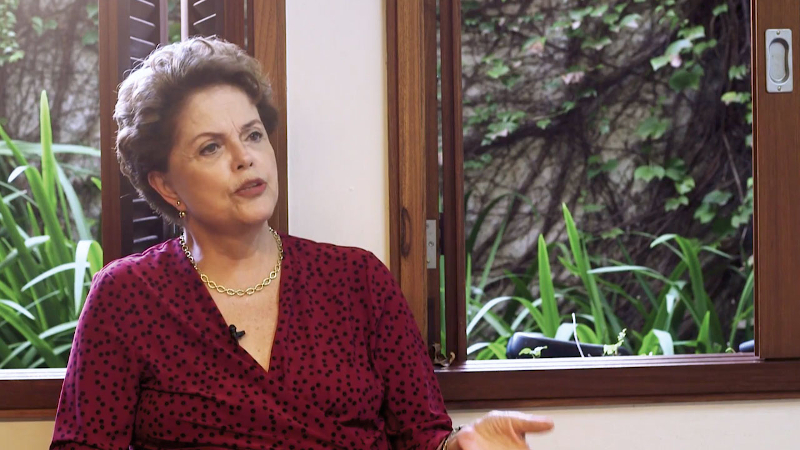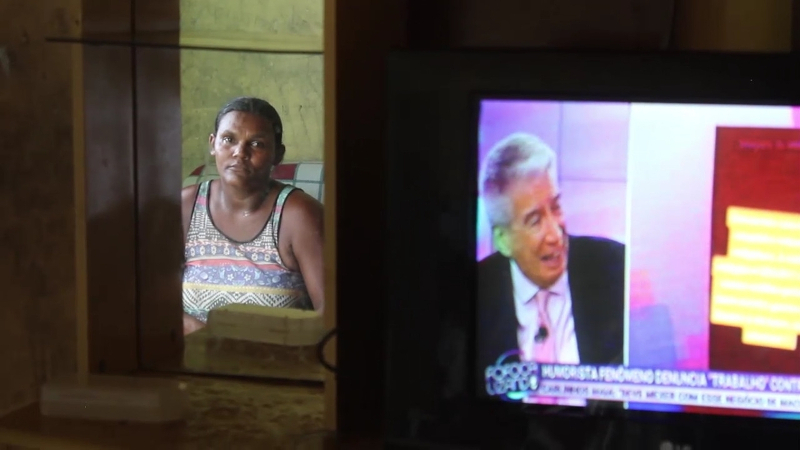Directors – Victor Fraga, Valnei Nunes – 2021 – UK, Brazil – 105m
****
An exploration of the role played by Brazilian media conglomerate Globo in various right wing Brazilian coup d’états over the decades – UK premiere on Sunday, May 29th 2pm at BFI Southbank followed by a discussion with special guests: Baroness Christine Blower, Jean Wyllys, Marcia Tiburi alongside the filmmakers
For the Brit, there’s something quite unnerving about coming to this documentary about the Brazilian political system and the role played within it by media conglomerate Globo, which controls the country’s most popular TV channel, newspapers and more. We think we have media bias problems here in the UK, but in this country we at least have a certain amount of press regulation enshrined in law and through such ethical bodies as the Press Council and institutions such as public service broadcasting.
That doesn’t appear to be the case in Brazil where, it seems, the media can do pretty much what they like without anyone holding them to account. Which also means that those outside of the country aren’t well-informed as to what goes on inside it since much of the information (or misinformation) about events from within the country is skewed. Which is to say that, in the UK, we’re not terribly well up on what’s going on in Brazil.

The directors explore the thesis that the impeachment in 2016 of Brazil’s left wing President Dilma Rousseff (the country’s first woman president) was a direct result of misinformation – fake news if you will – by the country’s near-monopoly TV channel Globo and other media in order to install a right wing administration more sympathetic to the rich and powerful elites, financial institutions and US interests with their accompanying agenda of neoliberalism.
This was not a coup involving military force and conflict, the model we immediately think of when we talk of a coup d’etat, but rather one carried out within existing, national, legal frameworks so that a coup took place without it even looking like a coup to the casual observer or the foreigner living at a distance and less familiar with the country’s internal machinations. If your press coverage emanates mostly from only one source, and there is no national regulating body to hold that source to account, you can make up whatever narrative you want to cover your activities and it seems people will believe you. Well, most people.
The history of Globo’s forays into media manipulation goes back to 1913 when its subsequent founder Roberto Marinho planted a roulette wheel in Rio de Janeiro’s Carioca Square for the sole purpose of reporting the moral decline of people playing roulette in public and stirring up national indignation in the incident’s wake. As a growing media organisation, Globo played a huge part in the success of the 1964 Brazilian coup which overthrew the country’s fragile democracy of almost two decades for a military dictatorship that lasted another two decades, after which democracy returned for 40 plus years thanks to the election of 1985.

The Coup d’État Factory quotes extensively from the earlier British Channel 4 TV documentary Beyond Citizen Kane (Simon Hartog, 1993) which compares Globo to Orson Welles’ fictional newspaper tycoon. This runs as a parallel thread to Fraga and Nunes’ investigation of Globo’s activity in more recent years. Thus, more contemporary events are placed in context to build up the broader picture.
Fraga and Nunes have assembled an impressive array of interview subjects from a variety of sources. Some come from within Brazil itself: literary critic and philosopher Marcia Tiburi, musician Chico Buarque, former or current MPs Jean Wyllys and Benedita de Silva, Senator Roberto Requião, former president Dilma Rousseff. Others come from the UK: human rights lawyer Geoffrey Robinson QC, BBC journalist Jan Rocha, Beyond Citizen Kane’s producerJohn Ellis as well as former London mayor Ken Livingstone.
They also interview heavyweight, investigative journalist Glenn Greenwald, co-founding editor of investigative journal The Intercept. It was Greenwald who in 2019 upset the Brazilian authorities by publishing evidence that the supposedly anti-corruption Operation Car Wash had been used for political ends, specifically to prevent former president Lula da Silva standing for re-election in the 2018 elections, paving the way for the right wing Jair Bolsonaro to be elected President.
For fairly obvious reasons, none of Globo’s own output was used in putting together this film, the directors relying rather on images and recreations by artists along with lots of impressively realised drone shots of Oscar Niemeyer’s stunning architecture in the federal capital Brasília.
Perhaps the most poignant moment occurs when Marcia Tiburi accidentally conflates the words Globo and coup into “gloup”, unintentionally providing the perfect onomatopoeia to sum up the media conglomerate’s activities and their pollutant effect on Brazilian society. You couldn’t make it up: catching it on camera is probably the next best thing, though.
The Coup d’État Factory has its UK premiere on Sunday, May 29th 2pm at BFI Southbank followed by a discussion with special guests: Baroness Christine Blower, Jean Wyllys, Marcia Tiburi alongside the filmmakers. Buy tickets here.
Trailer:
